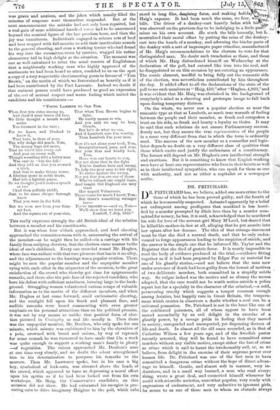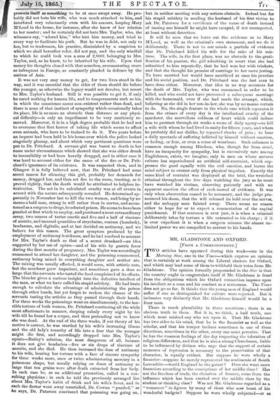DR. PRITCHARD.
DR. PRITCHARD has, we believe, added one more crime to the three of which he has been proved guilty, and the fourth of which he is reasonably suspected. Actuated apparently by a belief not unfrequent among profligates that mankind is less horri- fied by a murder prompted by illicit love than by a murder com- mitted for money, he has, it is said, acknowledged that he murdered his wife for love of the servant-girl Mary M'Leod, but denied that he killed his mother-in-law at all, alleging that he put aconite into her opiate after her decease. The idea of that strange statement must be that she died a natural death, and that he only endea- voured to forge appearances leading to the suspicion of suicide, and the answer is the simple one that he informed Mr. Taylor and the Registrar that she died of gastric fever. It is nearly impossible to read the body of evidence produced at the trial,—evidence fitting together as if it had been prepared by Edgar Poe as material for one of his ghastly stories,—and not believe that the man now under sentence of death had been guilty from the lowest of motives of two deliberate murders, both committed in a stupidly subtle way. So vulgar indeed was the motive and so clumsy the means adopted, that the case would not be worth notice outside a police report but for a specialty in the character of the criminal,—a cold, persevering cruelty which suggests a temper common enough among Asiatics, but happily rare in Great Britain, the tempera- ment which creates in observers a doubt whether a soul can be a universal possession. Dr. Pritchard is not in the least like one of the celebrated poisoners, all of whom appear to have been moved secondarily by an evil delight in the exercise of a ghastly power, by a savage pride in feeling that they moved in society, unregarded and unsuspected, yet dispensing decrees of life and death. In almost all the old cases recorded, as in that of Catherine Wilson a few years ago, and of the Swedish pastor recently arrested, they will be found to have committed some murders without any visible motive, except either the lust of crime as crime which is said to haunt the irredeemably evil, or, as we believe, from delight in the exercise of their supreme power over human life. Dr. Pritchard was one of the last men to have committed a dangerous crime without the hope of direct advan- tage to himself. Gentle, and almost soft in manner, very in- dustrious, and in a small way learned, a man who read every- thing, wrote a great deal, and connected himself whenever he could with scientific societies, somewhat popular, very ready with expressions of endearment, and very seductive to ignorant girls, he seems to us one of those men to whom an obstacle always presents aast omnucechswateatehaedwayt:o hiHme,proci ablydidi not hate hiswife, tobew interfered very reluctantly even with his amours, keeping Mary M'Leod in the house, for instance, after she knew of her relation to her master ; and he certainly did not hate Mrs. Taylor, who, the witnesses say, "adored him," who lent him money, and tried in every way to facilitate his path. But he was in debt, not only to her, but to tradesmen, his practice, diminished by a suspicion to which we shall hereafter refer, did not pay, and the only windfall to which he could look was a sum of 2,0001. belonging to Mrs. Taylor, and, as he knew, to be inherited by his wife. Upon that money his thoughts closed with that senseless, overmastering crave so infrequent in Europe, so constantly pleaded in defence by the natives of Asia.
It was not very easy money to get, for two lives stood in the way, and it was essential that the elder of them should die before the younger, as otherwise the legacy would not devolve, but revert to Mrs. Taylor's husband. Still it was possible to get it, if only he cared nothing for human life, and to temperaments such as his, in which the conscience seems non-existent rather than dead, and there is none of that instinct of sympathy which occasionally takes its place, life is no more an obstacle than distance or any physi- cal difficulty—is only an impediment to be very cautiously re- moved. Moreover, it is in a high degree probable that he had not to overcome that first horror of taking life which seems to affect even animals, who have to be trained to do it. Two years before an inquest had been held in his house over which the police looked singularly gloomy, and about which very pertinent questions were put to Dr. Pritchard. A servant-girl was burnt to death in her room under circumstances which showed that she was either drunk to insensibility or had been heavily drugged, and in either case it was hard to account either for the cause of the fire or Dr. Prit- chard's ignorance of its existence. It was suspected then, and in Glasgow it is fully believed now, that Dr. Pritchard had some secret reason for silencing this girl, probably her demands for money, drugged her, and then set fire to the room, trusting, as it proved rightly, that the death would be attributed to helpless in- toxication. The act in its calculated cruelty was at all events in accord with the nature subsequently revealed. He determined ap- parently in November last to kill the two women, and being by no means a bold man, strong in will rather than in nerves, and accus- tomed as a surgeon to drugs, he selected poison. He seems to have been puzzled at first which to employ, and purchased a most extraordinary array, two ounces of tartar emetic and five and a half of tincture of aconite, and unusual quantities of strychnine, corium (hemlock), laudanum, and digitalis, and at last decided on antimony, and we believe for this reason. The great symptom produced by the .employment of antimony is sickness, and he had resolved to account for Mrs. Taylor's death as that of a secret drunkard—an idea .suggested by her use of opium—and of his wife by gastric fever during the first months of pregnancy. Mrs. Taylor was accordingly _summoned to attend her daughter, and the poisoning commenced, antimony being mixed in everything daughter and mother ate. The mixing was usually effected, it would seem, with artistic care, but the murderer grew impatient, and sometimes gave a dose so large that the servants who tasted the food complained of its effects. The blunder gives a curious insight into the defective intellect of the man, or what we have called his stupid subtlety. He had brain enough to calculate the advantage of administering the poison through other hands, but yet forgot to reckon the chance of the servants tasting the articles as they passed through their hands. For three weeks the poisonings went on simultaneously, to the hor- rible torture of both women, Dr. Pritchard continuing all the while most affectionate in manner, sleeping calmly every night by his wife till he found her a corpse, and then pretending not to know she was dead. At the end of the three weeks, if our theory of his motive is correct, he was startled by his wife's increasing illness and the old lady's tenacity of life into a fear that the younger might die first, and accordingly dropped into Mrs. Taylor's opiate—Batley's solution, the most dangerous of all, because it does not give headaches—five or six drops of tincture of aconite, and she died. He then increased the dose of antimony to his wife, bearing her torture with a face of sincere sympathy for three weeks more, once or twice administering mercury in a poisonous shape, but usually relying on doses of antimony so large that ten grains were after death extracted from her body. In each case he, as an additional precaution, called in a con- sulting physician ; in each he told the previously arranged lies about Mrs. Taylor's habit of drink and his wife's fever, and in each the doctor went away unsatisfied, Dr. Cowan "puzzled," as be says, Dr. Paterson convinced that poisoning was going on,
but in neither meeting with any serious obstacle. Indeed but for his stupid subtlety in sending the husband of his first victim to ask Dr. Paterson for a certificate of the cause of death instead of issuing one himself he might have escaped, if not unsuspected, at least without detection.
It will be seen that we leave out the evidence as to Mary MLeod, as well as the criminal's own statement, and we do it deliberately. There is not to our minds a particle of evidence that Dr. Pritchard killed his wife for the sake of his mis- tress. The wife, in the first place, was no obstacle to the grati- fication of his passion, the girl admitting in court that she had submitted to him repeatedly, that he had won her with trinkets, and that she thought his promise of marriage to her mere jesting. To have married her would have sacrificed at once his practice and his social position, and Dr. Pritchard was the last man to have done either. Moreover, that idea in no way accounts for the death of Mrs. Taylor, who was summoned in order to be killed, and who could not have prevented a subsequent marriage with the housemaid, even if she had made the attempt, which, believing as she did in her son-in-law, she was by no means certain to do. No, the single feature in the whole case which separates it from the crimes of every day is the intellectual cruelty of the murderer, the marvellous coldness of heart which could induce him to protract through six weeks a scene of daily agony—to kill a wife with whom he had lived in amity for fifteen years, and whom he probably did not dislike, by repeated shocks of pain ; to bear a daily spectacle of suffering inflicted by himself without emotion, or feeling, or fear, or even a sense of weariness. Such calmness is common enough among Hindoos, who, though far from cruel, have an incapacity for sympathy, but is excessively rare among Englishmen, exists, we imagine, only in men on whose natures culture has superinduced an artificial self-restraint, which sup- presses the good equally with the evil emotion, and leaves the mind subject to overset only from physical impulses. Exactly the same kind of restraint was displayed at the trial, the wretched criminal throughout the five days watching the jury as he must have watched his victims, observing patiently and with no apparent emotion the effect of each morsel of evidence. It was only when observation ceased to be necessary, and the judge pro- nounced his doom, that the will released its hold over the nerves, and the unhappy man fainted away. There seems no reason either to hope for or to expect a commutation of the capital punishment. If that sentence is ever just, it is when a criminal deliberately takes by torture a life entrusted to his charge ; if it is ever expedient it is when a surgeon misuses the almoit un- limited power we are compelled to entrust to his hands.































 Previous page
Previous page